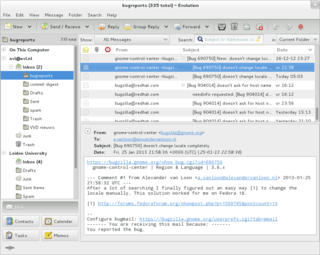An Internet filter is software that restricts or controls the content an Internet user is capable to access, especially when utilized to restrict material delivered over the Internet via the Web, Email, or other means. Content-control software determines what content will be available or be blocked.

Electronic mail is a method of transmitting and receiving messages using electronic devices. It was conceived in the late–20th century as the digital version of, or counterpart to, mail. Email is a ubiquitous and very widely used communication medium; in current use, an email address is often treated as a basic and necessary part of many processes in business, commerce, government, education, entertainment, and other spheres of daily life in most countries.
The Simple Mail Transfer Protocol (SMTP) is an Internet standard communication protocol for electronic mail transmission. Mail servers and other message transfer agents use SMTP to send and receive mail messages. User-level email clients typically use SMTP only for sending messages to a mail server for relaying, and typically submit outgoing email to the mail server on port 587 or 465 per RFC 8314. For retrieving messages, IMAP is standard, but proprietary servers also often implement proprietary protocols, e.g., Exchange ActiveSync.

Spamming is the use of messaging systems to send multiple unsolicited messages (spam) to large numbers of recipients for the purpose of commercial advertising, for the purpose of non-commercial proselytizing, for any prohibited purpose, or simply repeatedly sending the same message to the same user. While the most widely recognized form of spam is email spam, the term is applied to similar abuses in other media: instant messaging spam, Usenet newsgroup spam, Web search engine spam, spam in blogs, wiki spam, online classified ads spam, mobile phone messaging spam, Internet forum spam, junk fax transmissions, social spam, spam mobile apps, television advertising and file sharing spam. It is named after Spam, a luncheon meat, by way of a Monty Python sketch about a restaurant that has Spam in almost every dish in which Vikings annoyingly sing "Spam" repeatedly.

An Internet forum, or message board, is an online discussion site where people can hold conversations in the form of posted messages. They differ from chat rooms in that messages are often longer than one line of text, and are at least temporarily archived. Also, depending on the access level of a user or the forum set-up, a posted message might need to be approved by a moderator before it becomes publicly visible.
Newsgroup spam is a type of spam where the targets are Usenet newsgroups. Usenet convention defines spamming as excessive multiple posting, i.e. repeated posting of a message or near-similar messages to newsgroups. The spam may be commercial advertisements, opinionated messages, malicious files, or nonsensical posts designed to disrupt the newsgroups. A type of newsgroup spam is sporgery which is intended to make the targeted newsgroups unreadable. The prevalence of Usenet spam led to the development of the Breidbart Index as an objective measure of a message's "spamminess", and attempts to purge newsgroups of spam.

Email spam, also referred to as junk email, spam mail, or simply spam, is unsolicited messages sent in bulk by email (spamming). The name comes from a Monty Python sketch in which the name of the canned pork product Spam is ubiquitous, unavoidable, and repetitive. Email spam has steadily grown since the early 1990s, and by 2014 was estimated to account for around 90% of total email traffic.

OpenSolaris is a discontinued open-source computer operating system based on Solaris and created by Sun Microsystems. It was also, perhaps confusingly, the name of a project initiated by Sun to build a developer and user community around the eponymous operating system software.

The Spamhaus Project is an international organisation based in the Principality of Andorra, founded in 1998 by Steve Linford to track email spammers and spam-related activity. The name spamhaus, a pseudo-German expression, was coined by Linford to refer to an internet service provider, or other firm, which spams or knowingly provides service to spammers.
Norton Internet Security, developed by Symantec Corporation, is a discontinued computer program that provides malware protection and removal during a subscription period. It uses signatures and heuristics to identify viruses. Other features include a personal firewall, email spam filtering, and phishing protection. With the release of the 2015 line in summer 2014, Symantec officially retired Norton Internet Security after 14 years as the chief Norton product. It was superseded by Norton Security, a rechristened adaptation of the Norton 360 security suite.

The Scunthorpe problem is the unintentional blocking of online content by a spam filter or search engine because their text contains a string of letters that appear to have an obscene or otherwise unacceptable meaning. Names, abbreviations, and technical terms are most often cited as being affected by the issue.
Cleanfeed is the name given to various privately administered ISP level content filtering systems operating in the United Kingdom and Canada, and as of May 2012 undergoing testing in Australia with a view to future mandatory implementation. These government-mandated programs originally attempted to block access to child pornography and abuse content located outside of the nation operating the filtering system.

Tagged is a social discovery website based in San Francisco, California, founded in 2004. It allows members to browse the profiles of any other members, and share tags and virtual gifts. Tagged claims it has 300 million members as of 2014. As of September 2011, Quantcast estimates Tagged monthly unique users at 5.9 million in the United States, and 18.6 million globally. Michael Arrington wrote in April 2011 that Tagged is most notable for the ability to grow profitably during the era of Facebook.

Something Awful (SA) is an American comedy website hosting content including blog entries, forums, feature articles, digitally edited pictures, and humorous media reviews. It was created by Richard "Lowtax" Kyanka in 1999 as a largely personal website, but as it grew, so did its contributors and content. The website has helped to perpetuate various Internet phenomena, and it has been cited as an influence on Internet culture. In 2018, Gizmodo placed it as 89th on their list of "100 Websites That Shaped the Internet as We Know It".

Usenet, USENET, or, "in full", User's Network, is a worldwide distributed discussion system available on computers. It was developed from the general-purpose Unix-to-Unix Copy (UUCP) dial-up network architecture. Tom Truscott and Jim Ellis conceived the idea in 1979, and it was established in 1980. Users read and post messages to one or more topic categories, known as newsgroups. Usenet resembles a bulletin board system (BBS) in many respects and is the precursor to the Internet forums that have become widely used. Discussions are threaded, as with web forums and BBSes, though posts are stored on the server sequentially.

On 5 December 2008, the Internet Watch Foundation (IWF), a British watchdog group, blacklisted content on the English Wikipedia related to Scorpions' 1976 studio album Virgin Killer, due to the presence of its controversial cover artwork, depicting a young girl posing nude, with a faux shattered-glass effect obscuring her genitalia. The image was deemed to be "potentially illegal content" under English law which forbids the possession or creation of indecent photographs of children. The IWF's blacklist are used in web filtering systems such as Cleanfeed.
The history of email spam reaches back to the mid-1990s when commercial use of the internet first became possible - and marketers and publicists began to test what was possible.
iTunes Ping, or simply Ping, was a software-based, music-oriented social networking and recommender system developed and operated by Apple Inc. It was announced and launched on September 1, 2010, as part of the tenth major release of iTunes. The service launched with 1 million members[a] in 23 countries.

Path was a social networking-enabled photo sharing and messaging service for mobile devices that was launched on 14 November 2010. The service allowed users to share up to a total of 50 contacts with their close friends and family. Based in San Francisco, California, the company was founded by Shawn Fanning and former Facebook executive Dave Morin.
The child abuse image content list is a list of URLs and image hashes provided by the Internet Watch Foundation to its partners to enable the blocking of child pornography & criminally obscene adult content in the UK and by major international technology companies.










